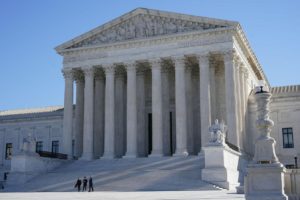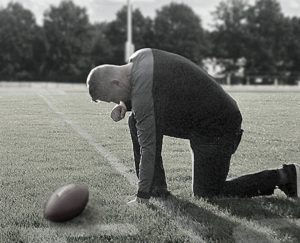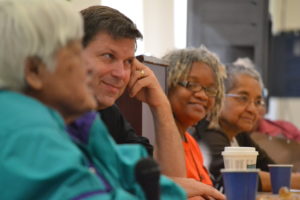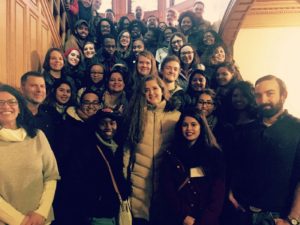Podcast: Play in new window | Download
Kennedy v. Bremerton School District: Rights To Religious Expression In The Workplace
On June 27, 2022, the U.S. Supreme Court handed down the case of Kennedy v. Bremerton School District. At issue was school employees’ First Amendment rights to religious expression while on the job. The Court held that a school district infringed on football coach Joseph Kennedy’s First Amendment rights when it disciplined him for engaging in “private” prayer. Kennedy was a coach at the Bremerton School District in Washington State. After games, he knelt on the field with some students joining him in prayer.
That so-called private prayer occurred on the 50-yard line. The school district forbade the coach to pray on the field after games. It did allow him to pray in a private location behind closed doors. After Coach Kennedy continued on the field to give his thanks to God, the school district placed him on administrative leave. It gave him a poor evaluation, despite a history of positive ones. Kennedy did not return the following year and sued, seeking reinstatement. He also relocated to Florida. The Supreme Court upheld Kennedy’s right to pray in public on the field after the game.
Guest – Andrew Seidel is a constitutional attorney and vice president of strategic communications at Americans United for Separation of Church and State, which litigated Kennedy v. Bremerton. He’s also the author of several books including The Founding Myth: Why Christian Nationalism is Un-American and American Crusade: How the Supreme Court is Weaponizing Religious Freedom, which hits shelves in September and explains a lot of what is happening at the court right now.
—–
Attorney John Philo: Sugar Law Center
Maurice Sugar was a workers’ lawyer and a socialist, one of the founding members of the National Lawyers Guild, the first General Counsel to the United Auto Workers and a staunch defender of working people’s rights. He was also a talented poet and songwriter of political songs and poems. In the 1950’s, during the height of the Cold War, Walter Reuther was elected President of the UAW. His first official action was to fire Sugar. Maurice and his wife Jane Sugar, who was an activist and union organizer of teachers, homesteaded over 100 acres of property in the Black Lake area of Michigan. At their deaths – he in the 1970s and she in the 1980s – a trust was created which formed the financial seed money for the founding of the Maurice and Jane Sugar Law Center for Economic and Social Justice in Detroit, Michigan.
In 1990, shortly after the death of Jane Sugar, a group of National Lawyers Guild national leaders, including NLG founding member Ernie Goodman, former National President Bill Goodman – both Trustees of the M & J Trust – and former national president Debra Evenson, used the endowment from the Sugar Trust to establish the Sugar Law Center. It brought to life a long-standing vision of creating a national public interest project of the NLG that would tackle the critical questions of the intersection between civil rights and economic justice. The Sugar Law Center began with a primary focus on plant closings and worker dislocation and Julie Hurwitz was the founding Director. Now, 32 years later, as a nationally recognized public interest workers rights’ law project, the work of the Sugar Law Center has expanded to take on issues of runaway corporate power, racism, community dislocation, gentrification, poverty, environmental injustice; women’s rights and many others.
Guest – Executive Director of the Sugar Law Center, John Philo. John has litigated cases in dozens of states representing low-wage workers, communities, and injured persons on matters of employment, constitutional, and tort law. John is also a former president of the Detroit Chapter of the National Lawyers Guild, and a contributing author to the National Lawyers Guild’s Employee and Union Member Guide to Labor Law and the Institute of Continuing Legal Education’s Torts: Michigan Law and Practice.
—————————————-




